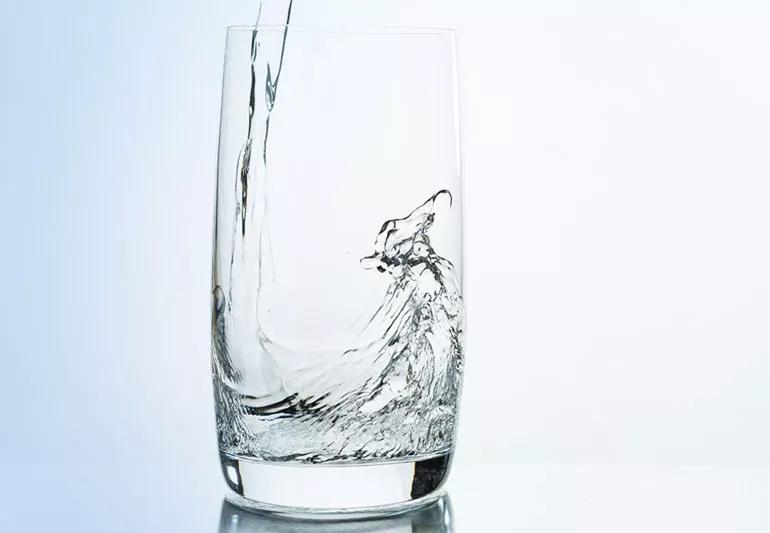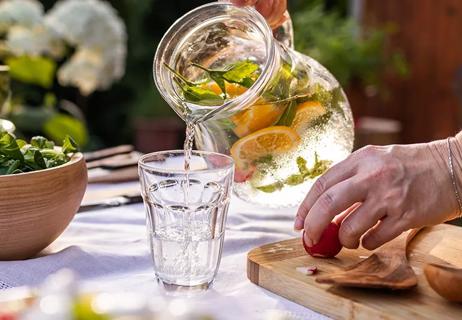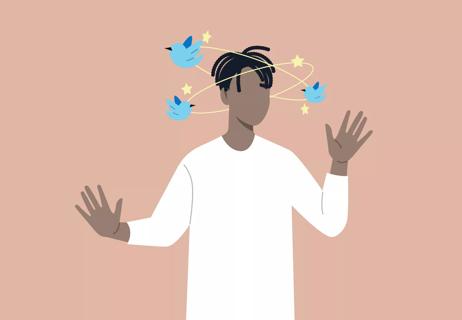Dehydration, medication and salty foods are often culprits

It’s not unusual to crave a cold glass of water on a hot summer day or after you’ve eaten something particularly spicy. But if you’re extremely thirsty, that can be a sign of a problem.
Advertisement
Cleveland Clinic is a non-profit academic medical center. Advertising on our site helps support our mission. We do not endorse non-Cleveland Clinic products or services. Policy
Family medicine specialist Matthew Goldman, MD, explains that there can be multiple reasons why you’re thirsty all of a sudden — and some are more serious than others.
“Thirst is a defense mechanism,” says Dr. Goldman. In other words, this is your body’s way of letting you know that your fluid levels are imbalanced.
Our body is made up of many tiny cells. Each cell needs a balanced amount of fluid — both inside and outside — to function properly.
“When there is less fluid outside of the cells than inside, fluid is drawn out of each cell to compensate,” explains Dr. Goldman, comparing it to the way a dry sponge soaks up water. “The resulting lack of fluid diminishes your cell’s ability to perform essential functions.”
When your cells don’t function normally, your overall body function starts to decline. Luckily, drinking fluid replenishes your cells and they start functioning normally again.
Typical reasons why you feel thirsty include:
You commonly feel thirsty due to dehydration. This can be caused by issues like:
Advertisement
Serious dehydration can cause physical and mental health issues. Luckily, when you’re dehydrated, your body will let you know to start drinking more fluids. (In fact, if you’re thirsty, that’s a sign you’re already dehydrated.)
“You have receptors in your veins and around your heart that detect low fluid volume,” says Dr. Goldman. “You also have receptors in your carotid arteries and aorta that detect low blood pressure.”
Your kidneys also release hormones during times of dehydration because you have diminished blood flow. “We have strong evidence to support these hormones stimulate receptors around your brain, activating thirst centers within a portion of your brain called the hypothalamus,” explains Dr. Goldman. “This causes us to feel thirsty.”
Drinking fluids stimulates receptors in your mouth and throat, Dr. Goldman adds. “These receptors provide feedback to the hypothalamus to lessen the thirst sensation.”
Increased urination and excessive thirst are two telltale signs of the onset of Type 2 diabetes. These can also be symptoms of hyperglycemia, a condition where there’s too much sugar (or glucose molecules) in your blood.
“If you have too much sugar floating around in your bloodstream, this sugar will begin to leave via your kidneys and enter the urine,” states Dr. Goldman. “Basically, this is a defense mechanism to help the body rid itself of excessive sugar.”
As the excessive glucose molecules enter your urine, the glucose draws water with it like a sponge. As a result, you produce more urine — and then pee more. “Your body expels the sugar from your body via urine,” says Dr. Goldman.
As we lose those excess fluids, we eventually become dehydrated and may end up in the emergency department.
Dehydration could also be a sign of a condition known as diabetes insipidus. When you have diabetes insipidus, you can’t hold onto water. In fact, you lose it through urination.
Certain medications can cause side effects like thirst. “Lithium is widely known to possibly result in excessive urine output and therefore increased thirst,” states Dr. Goldman. “Over time, lithium may eventually block the activity of antidiuretic hormone (ADH) in the kidneys. That’s what leads to excess urination and thirst.”
A number of other medications — antipsychotics, antidepressants, anticonvulsants, anticholinergics and alpha agonists — can cause dry mouth and, therefore, trigger thirst.
Dr. Goldman also notes that SGLT2 inhibitors (a kind of diabetes medication), as well as steroids, can also make you feel thirsty. SGLT2 inhibitors lower blood sugar levels by increasing the release of glucose from your blood into the urine. Steroids, in contrast, often raise sugar levels.
Advertisement
If you start taking steroids (whether short term or long term), you might be encouraged to monitor your blood sugar levels — or accommodate higher levels by taking more medications for diabetes.
Let’s face it, salty foods are delicious. The only downside? Chances are good they’ll make you feel thirsty.
“After we eat salty foods, the salt gets absorbed into your bloodstream,” says Dr. Goldman. “The salt then draws fluid from our tissues into our circulation.”
This excessive pressure triggers receptors that sense the presence of sodium in your blood. “Your kidneys create extra urine to reduce the fluid and sodium levels within your bloodstream,” he explains. “Fluid from your tissues gets pulled into your bloodstream to accommodate. And then, your tissues and cells become dehydrated, and we need to replenish the fluid balance.”
Having a dry mouth makes you feel more thirsty.
Hyperthyroidism — or the condition where your thyroid is overactive — might cause increased sweating, which in turn causes thirst.
If you’re feeling thirsty, does that automatically mean you’re already dehydrated? Not necessarily, says Dr. Goldman.
“A condition called psychogenic polydipsia (PPD) means you have a desire to drink but aren’t necessarily dehydrated,” he says.
Advertisement
This is often seen if you’re living with underlying mental health issues like schizophrenia. “You might drink excessively without one of the previous underlying stimuli for thirst being present.”
Where coping with thirst is concerned, hydration is key.
Drinking water is one of the best ways to stay hydrated and keep thirst away, although you’re probably always wondering how many glasses of water a day you should be drinking.
“Generally, the amount of water you need varies depending on your individual health, activity level, sex, age and more,” says Dr. Goldman. “My response is often to drink enough water to keep your urine clear, unless otherwise advised.”
If you’re working out, this equation might change. According to the American College of Sports Medicine, to avoid dehydration, people who are active should drink at least 16 to 20 ounces of fluid one to two hours before an outdoor activity. After that, you should consume 6 to 12 ounces of fluid every 10 to 15 minutes that you’re outside. When you’re finished with the activity, you should drink more. How much more? To replace what you’ve lost, at least another 16 to 24 ounces (2 to 3 cups).
Electrolytes such as sodium and potassium help keep your body functions running smoothly. When you’re thirsty, drinking fluids with electrolytes, like certain sports drinks, might be best.
Advertisement
“For example, if you’ve lost electrolytes through sweat, you may want to drink electrolyte replacement solutions,” advises Dr. Goldman, who adds that your doctor can help you choose the right electrolyte replacement for your situation. “Significant diarrhea and/or vomiting may require different forms of repletion from significant blood loss.”
“In general, you should avoid drinking fluids that have excessive amounts of sugar in them,” says Dr. Goldman. “This may eventually lead to uncontrolled blood sugar levels and cause you to pee more.” Also try to avoid alcohol and caffeinated beverages, such as coffee and sodas. These fluids tend to pull water from your body and promote dehydration.
Certain foods help you stay hydrated because they’re heavy on water content. And many have added benefits like essential nutrients your body needs.
If you’re living with diabetes, being dehydrated can be extremely dangerous. You might have to go to the ER and get fluids through an IV, as well as vitamins and medications to get your sugar levels safely under control.
“You should also speak to your doctor about your sugar levels and what is considered a normal blood sugar level for yourself, as well as what to do if these levels become abnormal,” states Dr. Goldman.
One way to make sure you’re properly hydrated is to check your urine. “The goal is to keep the urine clear,” says Dr. Goldman. “If it starts to become yellow, then you’re getting dehydrated.” In the morning, drink enough water to get your urine clear.
Most of the time, you can conquer your thirst by taking the simple steps above. But in a few situations, more help might be needed.
“If you’re still thirsty even after drinking a lot of water and can’t seem to quench your thirst, talk to your doctor,” says Dr. Goldman. “Also, talk to them if you’re thirsty more often — or to a greater extent than you might anticipate.”

Sign up for our Health Essentials emails for expert guidance on nutrition, fitness, sleep, skin care and more.
Learn more about our editorial process.
Advertisement

Not drinking enough, drinking too much at once and overdoing it on caffeine can all leave your body short on fluids

Cucumbers, celery and (of course) watermelon are among foods with high water content

Being short on fluid causes hormonal imbalances, brain fog, sleep issues and more

Drink water, of course! But there are also other ways to stay hydrated

Body changes put older adults at increased risk of dehydration

Not drinking enough fluids can send your blood pressure on a rollercoaster ride

Keto can reduce blood sugar, but that doesn’t mean it’s right for everyone

This diabetes medication can treat obesity, but it’s not for people who just want to drop a few pounds

Even small moments of time outdoors can help reduce stress, boost mood and restore a sense of calm

A correct prescription helps your eyes see clearly — but as natural changes occur, you may need stronger or different eyeglasses

Both are medical emergencies, but they are very distinct events with different causes